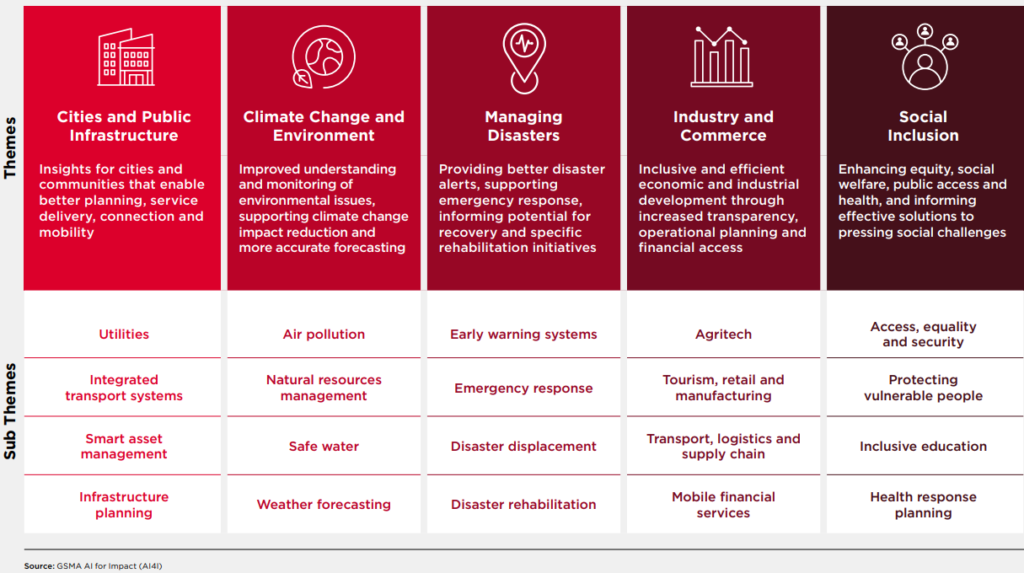Artificial Intelligence and Mobile Big Data (AI/MBD) have the potential to address some of the most pressing socioeconomic challenges facing low- and middle-income countries. AI and MBD can help governments and development agencies harness more accurate, timely and accessible data to inform policymaking and contribute to the Sustainable Development Goals (SDGs). These technologies are already creating social impact across a wide range of areas and have the potential to benefit millions of people across the world.
What is AI/MBD? AI refers to the use of data to make decisions or perform tasks normally considered to require human knowledge, intelligence, learning and understanding. MBD solutions refer to network traffic (from people, sensors and connected devices), combined with wider datasets, such as public data from government, harnessed through big data analytics, AI and machine learning.
Southeast Asia has a conducive environment for AI/MBD for development
In our new report, Mobile Big Data and Artificial Intelligence: Towards sustainable development in Southeast Asia, we look at how AI/MBD are being used to support the SDGs in the region.
Globally, Southeast Asia is the region that is expected to see the most significant growth in connectivity. Today, mobile broadband networks cover around 96% of the region’s population. 5G, a key enabler for AI/MBD, is set to accelerate as the technology’s footprint expands.
Figure 1: Projected share of 5G connections in Southeast Asia, 2030
5G connections as a percentage of total connections
Our regional assessment shows that Indonesia, Malaysia, and Thailand can greatly benefit from AI/MBD solutions for sustainable development
All three countries benefit from a vibrant mobile economy and increasing investments in frontier technologies. 5G deployment has already started in the three markets and will further enable the adoption of AI/MBD. By 2030, 5G is expected to make for at least 65% of total connections in Malaysia and Thailand.
Improved connectivity has benefited not only citizens and businesses but also the public sector, allowing for more efficient internal government processes and quality public service delivery. According to the 2022 E-Government Development Survey, Indonesia, Malaysia and Thailand perform better than the world average, suggesting they have the required laws and regulations, infrastructure and systems, and institutional backing to leverage digital connectivity.
Figure 2: E-Government development scores in Southeast Asia, 2022
Source: United Nations
Our research shows that these countries benefit from enabling policies and established AI champions, both from the public and private sector. Tech entrepreneurship is also flourishing in some markets, helped by policies that facilitate access to credit and financing.
Climate action and improved urban mobility are key opportunity areas for the application of AI/MBD
Southeast Asian countries are particularly vulnerable to the effects of climate change and face a number of infrastructure challenges due to rapid urbanisation. Using a framework developed by GSMA AI for Impact, we identified three uses cases with high potential for social, environmental and economic impact: proactive flood detection in Indonesia, transport and mobility in Malaysia, and forest monitoring systems in Thailand.
Figure 3: The GSMA AI for Impact Use Case Framework

The capacity to enhance disaster preparedness and response is a pressing need for Indonesia, where 76 million people live in areas at high risk of flooding. Sensors that monitor water levels and inundation can be used to predict the risks of natural disasters. At the same time, location data from mobile subscribers, once aggregated and anonymised, can provide necessary insights on at-risk populations.
In Malaysia, insights generated from AI/MBD can be used to provide estimates of traffic in real-time and enable authorities to take measures to limit air pollution, resulting in lower congestion and better transport and infrastructure planning. As the country experiences rapid urbanisation, improving urban mobility will also have positive environmental impacts.
Integrating AI/MBD into monitoring carbon sequestration in forests is a promising use case for Thailand, a country heavily reliant on emission-generating fossil fuels to meet its energy needs. Combined with satellite images, data from sensors can be used to capture the amount of carbon in a forest. These insights can then be used to support the issuance and trading of carbon credits.
Cross-sector collaboration, beyond MNOs and government, is crucial to sustain AI/MBD initiatives over time
While MNOs and government agencies are taking a lead in the design, development and implementation of AI/MBD solutions, impactful and sustainable initiatives require collaboration with other actors, such as tech companies and startups, academic and non-profit organisations. Co-developing business models based on shared incentives is fundamental to allow solutions to scale over time.
Donor organisations, development agencies and industry associations can encourage collaboration and innovation by supporting governments and MNOs in developing solutions, for instance by conducting needs assessments and initiating partnerships. They can also raise awareness and showcase best practices from successful global AI/MBD implementations.
As the ecosystem matures, areas of support (e.g. technical assistance) will eventually include responsible data policies, facilitating skills and capacity development and supporting government initiatives to reform the education curriculum. Donors can also play a key role in designing frameworks for monitoring and evaluating the success of AI/MBD solutions with the purpose of raising awareness, securing investments and informing policy-making.
To find out more about the potential of AI/MBD for sustainable development in Southeast Asia, read the GSMA Mobile for Development report.
THIS INITIATIVE IS CURRENTLY FUNDED BY THE UK FOREIGN, COMMONWEALTH & DEVELOPMENT OFFICE (FCDO), AND SUPPORTED BY THE GSMA AND ITS MEMBERS.





